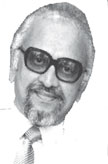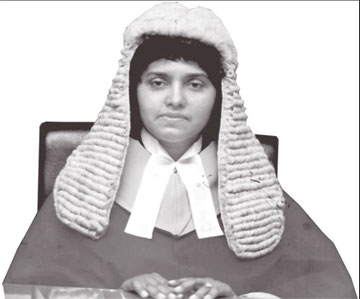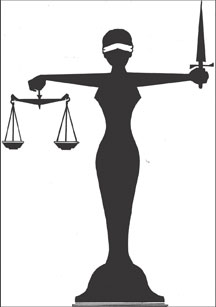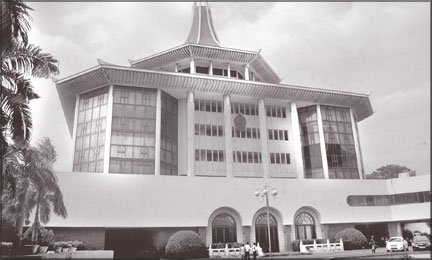Playing tennis in Hulfstdorp
 H. L. D. Mahindapala H. L. D. Mahindapala
By its very nature impeachments rouse public passions to feverish
pitches as seen in the cases of President Bill Clinton and President
Ranasinghe Premadasa. One of the reasons is the high public profile of
those impeached. Second, the process and the final decision, which are
invariably gets politicized by both sides, intentionally or
unintentionally, can also have serious consequences. Besides,
impeachments also tend to polarise society as seen in the current case
where lawyers, most of whom ganged up initially against the appointment
of the CJ, did a flip and screamed: “Doshoabiyogaya bangawewa” as the
Chief Justice, Dr. Shirani Bandaranayake, was about to leave for
Hulftsdorp and face the Parliamentary Select Committee in
Jayawardenepura. (The video of this demonstration of loyalty to the CJ
by the kalu koat kerum karayas(KKKKS) is now circulating in cyber space.
The Kalu Koat fans only stopped short of asking for her autograph!)
|

Chief Justice, Dr. Shirani Bandaranayake |
There were no signs among the KKKKs who milled round the CJ that they
could trigger of a political revolt from Hulftsdorp. They were letting
off a lot of hot air which seemed theatrical acts done more to register
their faces for future reference with the CJ. It seems to be an act more
of buying an insurance policy for their future than fighting for the
independence of the judiciary.
They were yelling their lungs out, punching the air, as if the
Supreme Court and the independence of the judiciary would collapse once
Chief Justice goes to face the PSC in Parliament. But the history of the
judiciary has shown that individual judges come and go and the Supreme
Court and the independence of the judiciary (which has been fluctuating
depending on who presides as the CJ) will go on marching as long as the
people need a judiciary to adjudicate on their affairs.
Controversy over impeachment
Predictably, the passions roused in the impeachment of the CJ tend to
split the community on political lines. The UNP, TNA, NGOs, the Western
embassies, the KKKKs’s, left-wingers and the usual suspects in the
anti-Government lobbies have lined up behind the CJ. (The signature
placed by the doughty fighter on behalf of the nation, S. L. Gunasekera,
has surprised many and he certainly must be having his own good reasons
for him to go against the impeachment motion). Their general complaint
is that the impeachment is a politically motivated act, or it is a
vindictive act against the CJ who had given decisions against the
government, or it violates the independence of the judiciary.
These accusations tend to divert attention from the main issue of
CJ’s conduct. She faces 14 charges and there is a prima facie case which
she has to answer and she in turn has filed her response. Her replies
are circulating in web sites and, incidentally, this violates the
Standing Orders. It could have come out only from the members of the
opposition who are in her camp.

The leak is undoubtedly a politically motivated act to counter the
charges faced by her. Both sides are engaged in secret campaigns against
each other to win the moral high ground. But the Cheif Justice who is
aware of the value of winning this campaign is not averse to winding
down her car and smile for the camera as she moves up and down to
Parliament. Besides, her mob jumping up and down at Hulftsdorp does not
add to her stature of being above the lowest common denominator.
Moving on, it must be noted that there are several intertwining
strands involved in the current controversy over the impeachment. All
strands -- political, legal, financial, familial (i.e. CJ’s handling of
her sister’s investments and her husband’s affairs), ideological,
historical etc., -- weave through twists and turns into the single issue
of the independence of the judiciary. Both sides are canvassing this
issue. However, the critical phrase “independence of the judiciary” does
not give judges the licence to act arbitrarily, impulsively,
egotistically or arrogantly to boost their power and ego. The judges too
are liable for any misconduct and it is to restrain and control the
“misbehaviour and incapacity” of the judiciary that Article 107 is
written into the Constitution.
CJ has made it clear that she is determined to fight back and has
challenged the right of parliament to try her. This drags the whole
issue deeper into murky politics. In principle it has come down to a
contest between the judiciary and the parliament testing each other’s
nerve to see who would blink first. The final outcome will draw the
indelible parameters of the future powers of both branches of the state.
The primary objective of judiciary led by the CJ is to cut down the
powers of the Parliament and transfer them to the judiciary. Naturally,
CJ’s team of lawyers is pushing with all their might to downgrade
Parliament by increasing the powers of the judiciary. As it is there is
a balance where the judiciary can try members of the legislature and the
legislature can try members of the judiciary. Besides, there is no other
provision to try and remove judges for misconduct or incompetence other
than through impeachment by Parliament.
The legal strategy of the CJ’s team is to invoke Article 125 (7) and
impress on the judges that the time has come for them to grab power to
be a law unto themselves without any constraints from Parliament or any
other source. The law as it stands right now has empowered the
Parliament to try public officers like judges for misconduct. In fact
Parliament has been accepted as the only means by which judges and
presidents can be impeached for misconduct. Similar provisions exist in
USA. For instance, the Congressmen in the Lower House impeaches the
judges and the Senate in the Upper House sits in judgment. And if found
guilty the accused is booted out with a two thirds vote in the Senate.
The judiciary has no role in judging the impeached presidents or the
judges. So the practice of the legislature turning into the prosecutor,
judge, jury and the executioner is entrenched in the US impeachment
process.
|

Supreme Court Complex |
The 1978 Constitution of Sri Lanka grants the legislature the power
of impeaching and trying the judges. The difference is that in US both
houses are involved in the process. In Sri Lanka the process is confined
to a select committee of the Parliament in which the government and the
opposition are represented by their members.
In US the entire legislature participates in the proceedings while in
Sri Lanka only a microcosm of the legislature is given powers to sit in
judgement.
As things have evolved it is now apparent that the impeachment has
resulted in a power struggle between the two gigantic forces determined
to win. The politics of both sides is covered in legal jargon and
cliches like “independence of the judiciary” etc. Nevertheless, there is
much controversy as to whether the impeachment is a political process ,
or a judicial process, or both. Can the legislature sit in judgment over
the judiciary? As shown above, this process has been tried and tested in
the US Constitution and it has stood the test of time. In fact, it was
the legislature that tried President Bill Clinton and not the judiciary.
It is this power of Parliament that is contested by the CJ.
In Sri Lanka, at the eleventh hour, after the CJ was presented with
14 charges, issues of constitutionality, morality, legality have cropped
up out of the blue. No one questioned the constitutionality earlier when
President Premadasa was impeached by his own party. In the current
crisis, one issue that has surfaced is whether the legislators can sit
as judges of judges. In the case of President Premadasa hardly anyone
questioned whether the Legislature can challenge the Executive. Now that
the issue of whether the Legislataure can challenge the Judiciary has
come, this should be balanced with the equally controversial issue of
whether the CJ can appoint judges to judge her. Under the Constitution
and as head of the Judicial Service Commission it is the CJ who appoints
judges to hear cases.
Legal process
In fact, one of the charges she is facing is just that. Her decision
to appoint herself into the court hearing a case in which her sister was
involved is one of the issues that is canvassed in the 14 charges
against her. Well, if the CJ can appoint judges to judge her, or if she
can appoint herself into a case where her sister’s investments were
involved what is wrong in Parliament appointing law-makers from both
sides of the house to judge the judges?
Whatever questions may arise, isn’t a mechanism outside the judiciary
necessary to judge the judges? And if the judges happens to be the
law-makers, as stated in the law, let the process proceed until it is
changed by the legal process.
For the judiciary to intervene to change the law ONLY when its head
is facing charges doesn’t do much to raise the image of the judiciary as
an impartial and objective institution willing to face the law faced by
all other citizens. It certainly makes the CJ look like an Orwellian
panjandrum who is more equal than the others before the law. If there is
any move to change the law this is not the time to do it. It has to be
changed after the impeachment charges are brought to a conclusion. How
many accused has had the privilege of the legal fraternity standing up
in court and outside court demanding that their client’s case should not
be heard because the law and the charges are unfair? Which one of those
lawyers fawning in front of the CJ will go to court and denounce the law
and charges against their clients and move heaven and earth to stop the
case?
Judiciary and legislature
On the contrary, will they charge their clients exorbitant fees and
advise them to fight until their pockets run out of money and go to
jail. It may not have occurred to the learned legal fraternity fighting
for the CJ that they are indulging in a dangerous game where they are
intervening to change the law in the middle of a case with the sole
intent of giving a special advantage to their favoured client. This is
like President D. B. Wijietunge ringing the insurance commissioner and
asking him to issue an insurance policy to reimburse his constitutent
whose house had burnt down to cinders a month before. You don’t buy
insurance policies after the event. You buy it before the event hits
you. Where is the rule of law and natural justice if a selected few are
allowed to buy insurance after their assets have been reduced to ashes?
The rights and wrongs of Standing Order 78 A empowering the
legislature to sit judgment over the judges is an issue that can be
debated till the cows come home and it is up to the law-makers to change
it or not. But, in the meantime, both the judiciary and the legislature
must act according to the the law as it stands. In the submissions of K.
Kanag-isvaran P.C. to the Court of Appeal he states the law as it
stands.
He states: “ 7. The question posed by the Court of Appeal as to the
‘forum’ is predicated on an exigency arising from the provisions of
Article 107(3) of the Constitution, which states: “Parliament shall by
law or by Standing Orders (emphasis mine) provide for all matters
relating to the presentation of such an address, including the procedure
for the passing of a such resolution, the investigation and proof of the
alleged misbehaviour or incapacity and the right of such Judge to appear
and to be heard in person or by representative.”
According to 107 (3) cited by counsel for CJ, K. Kanag-isvaran, the
Parliament has the option of deciding the issue by “law” OR (emphasis is
mine) by “Standing Orders”. Which means that Standing Order 78A is
recognised in law as a legal entity with the power to deal with all
matters pertaining to an impeachment. Nowhere in law is this Standing
Order excluded. The conjunction “or” gives equal status to PSC as that
of a court of law.
But more importantly, Kang-isveran also states that the option of
deciding the methodology is given exclusively to Parliament .
To quote him: “8. The Parliament has been given an option as to the
methodology to be adopted for bringing to fruition the matters referred
to in Article 107(3) including those relating to “…the forum before
which the allegations are to be proved, the mode of proof, burden of
proof, standard of proof etc., of any alleged misbehaviour or incapacity
in addition to matters relating to the investigation of the alleged
misbehaviour or incapacity?” This is ciritical in deciding who has the
power to hear cases of impeachment. If the option is given only to
Parliament -- he does not mention the “law” -- then it excludes the
“law” as having the option to decide on hearing cases of impeachment.
Empower court
Lawyer Kanag-isvaran is absolutely clear that “the Parliament has
been given an option as to the methodology to be adopted for bringing to
fruition .....” matters related to impeachment. So his argument amounts
to saying that the option given by law to Parliament should be removed
and handed over to the courts.
In other words, he is insisting that the Courts must stage a legal
coup to grab power from Parliament. The law as it exists does not
provide the “law” to pick either the methodology or the means to bring
to fruition matters pertaining to impeachment. According to him it is
the Parliament that has been given the option to decide on the
methodology.
Having conceded that the option has been given to Parliament -- mark
you, not to the judiciary -- to decide on the methodology for hearing
the case, he argues that the courts should now interpret under Article
125 (1) to give that option to the courts. In other words, he is
attempting to empower court with a right to override Parliament and grab
power exclusively to the courts. He is moving to legalise the power grab
of the courts through an interpretation made by the courts for the
enhancement of the powers of court.
This is a move to make the courts the law-maker instead of being an
interpreter of the law.
It is a move for the courts to usurp the powers of Parliament through
unwarranted, if not devious, judicial activism open under Article 125
(1) which enables subjective interpretation.
In the current climate, where the judiciary and the legislature are
on head-on collision, it is a foregone conclusion that the courts would
go all out to grab as much power as it could to override and subjugate
Parliament to its will. The disguise of fighting for “the inedependence
of the judiciary” is too transparent to hide the real objective: save
the career of the CJ. But it is not here career that is going to save
“the independence of the judiciary”. This cry is merely an act of
fear-mongering. The independence of the judiciary depends of far greater
forces than saving the seat of the CJ. She knows the law. Her own layers
say that the “law” has no place in trying her. She must face the charges
in the place where the law says she must face and then accept the
outcome, whatever that may be.
Even though the law says that the option of who should hear the case
is with Parliament Kanag-isveran argues in the court of Appeal that it
is now “a matter of interpretation” as to who should hear the
impeachment. Simply put, he is saying that the courts must engage in
judicial activism to interpret the law in a manner that would reject the
law enshrined in the Constitution and grab power from Parliament and
hand it over to the courts to hear the case against the Chief Justice.
He says: “9. The selection of whether it shall be by “law” or Standing
Orders” thus became a matter of interpretation as articulated by the
Court of Appeal in its reference made to Your Lordship’s Court under
Article 125 (1) of the Constitution. On that selection it is
respectfully submitted hangs the future of the independence of the
judiciary.”
Dictatorship of judiciary
His conclusion is equally untenable. His logic is that “the
independence of the judiciary” depends on the courts dismissing the
prevailing law and grabbing power, which it does not have, from
Parliament (1) to judge its own judges and (2) to dictate to the
legislature. If the judiciary wins it would be the first step in paving
the path for a dictatorship of the judiciary. By all known accounts the
legal fraternity has just come out of of the reign terror under one
Chief Justice without powers of restraint. The tyranny of a Chief
Justice with absolute power, where only CJ’s own courts under the thumb
of the CJ can judge the CJ, will be the very source of undermining the
independence of the judiciary. It would be a disaster not only for the
legal fraternity but to the nation as a whole.
In short, Kanag-isveran is asking the courts to interpret the law in
favour of the CJ to remove and deny Parliament the right to exercise its
option which it had exercised in the past on matters of impeachment (
e.g., President Premadasa). He is saying, in other words, that it is the
courts that is competent to judge the misconduct of the judges (and in
this case the very head of the courts) and not Parliament which is
legally empowered to do so. His argument is summed up in the pithy
Sinhalese idiom which says:”horagay amma-gen pay-na ahanna wagai.”
In any case, both the courts and Parliament can be accused of
political partisanship. But since the impeachment involves the head of
the judiciary, who appoints the judges who would sit in judgment over
her, can the transfer of the hearing to courts make it seen to be more
impartial and just than the Parliament? If the conduct of KKKKs in
Hulftsdorp is any indication of the political tilt of the legal
fraternity -- particularly with the CJ lapping up the adulation and the
poojas -- then the courts must be written off as a fair and just means
of hearing the case against the CJ.
In summary, lawyer Kang-iswaran’s argument amounts simply to this: we
have been playing tennis so far with a net in the middle, but for the
sake of the CJ we must now play tennis without the obstructing net.
This poses a serious question to the CJ: should she play tennis like
all others with a net in the middle as required by the rules of the game
or get out of courts? |







